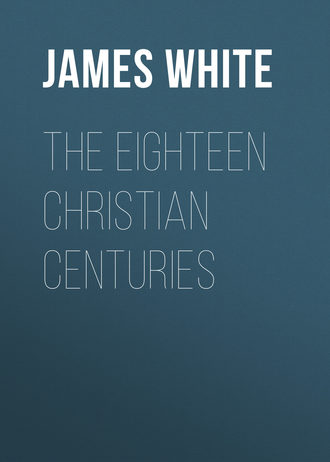 полная версия
полная версияThe Eighteen Christian Centuries
TENTH CENTURY
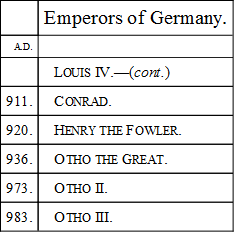
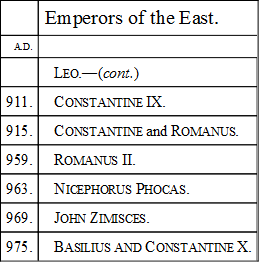
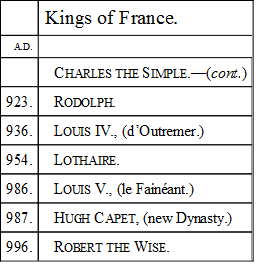
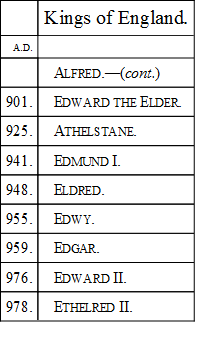
Suidas, (Lexicographer), Gerbert, Odo, Dunstan.
THE TENTH CENTURY
DARKNESS AND DESPAIRThe tenth century is always to be remembered as the darkest and most debased of all the periods of modern history. It was the midnight of the human mind, far out of reach of the faint evening twilight left by Roman culture, and further still from the morning brightness of the new and higher civilization. If we try to catch any hope of the future, we must turn from the oppressed and enervated populations of France and Italy to the wild wanderers from the North. By following the latter detachment of Norsemen who made their settlements on the Seine, we shall see that what seemed the wedge by which the compactness of an organized kingdom was to be split up turned out to be the strengthening beam by which the whole machinery of legal government had been kept together. Romanized Gauls, effeminated Franks, Goths, and Burgundians, were found unfitted for the duties either of subjects or rulers. They were too ambitious to obey, and too ignorant to command. Religion itself had lost its efficacy, for the populations had been so fed with false legends, that they had no relish for the truths of the gospel, which, indeed, as an instrument of instruction, had fallen into complete disuse. Ship-loads of false relics, and army-rolls of imaginary saints, were poured out for the general veneration. The higher dignitaries of the Church were looked on with very different feelings, according to the point of view taken of them. When regarded merely as possessors of lands and houses, they were loved or hated according to the use they made of their power; but at the very time when cruelties and vices made them personally the objects of detestation or contempt, the sacredness of their official characters remained. Petitions were sent to the kings against the prelates being allowed to lead their retainers into battle, not entirely from a scruple as to the unlawfulness of such a proceeding, but from the more serious consideration that their death or capture would be taken as a sign of the vengeance of Heaven, and damp the ardour of the party they supported. Churches and cathedrals were filled with processionary spectacles, and their altars covered with the offerings of the faithful; and yet so brutal were the manners of the times, and so small the respect entertained for the individual priest, that laymen of the highest rank thought nothing of knocking down the dignitaries of the Church with a blow on the head, even while solemnly engaged in the offices of devotion. The Roman pontiffs, we have seen, did not scruple to avail themselves of the forgeries of their enthusiastic supporters to establish their authority on the basis of antiquity, and at the middle of this century we should find, if we inquired into it, that the sacred city and chair of St. Peter were a prey to the most violent passions. Many devout Roman Catholics have been, at various periods, so horrified with the condition of their chiefs, and of the perverted religion which had arisen from tradition and imposture, that they have claimed the mere continued existence of the Papacy as a proof of its Divine institution, and a fulfilment of the prophecy that “the gates of hell should not prevail against it.” Yet even in the midst of this corruption and ignorance, there were not wanting some redeeming qualities, which soften our feelings towards the ecclesiastic power. It was at all times, in its theory, a protest against the excesses of mere strength and violence. The doctrines it professed to teach were those of kindness and charity; and in the great idea of the throned fisherman at Rome, the poorest saw a kingdom which was not of this world, and yet to which all the kingdoms of this world must bow. Temporal ranks were obliterated when the descendants of kings and emperors were seen paying homage to the sons of serfs and workmen. The immunity, also, from spoil and slaughter, which to a certain extent still adhered to episcopal and abbatial lands, reflected a portion of their sanctity on the person of the bishop and abbot. Mysterious reverence still hung round the convents, within which such ceaseless prayers were said and so many relics exposed, and whither it was also known that all the learning and scholarship of the land had fled for refuge. The doles at monastery-doors, however objected to by political economists, as encouragements of mendicancy and idleness, were viewed in a very different light by the starving crowds, who, besides being qualified by destitution and hunger for the reception of charitable food, had an incontestable right, under the founder’s will, to be supported by the establishment on whose lands they lived. The abbot who neglected to feed the poor was not only an unchristian contemner of the precepts of the faith, but ran counter to the legal obligations of his place. He was administrator of certain properties left for the benefit of persons about whose claims there was no doubt; and when the rapacious methods of maintaining their adherents, which were adopted by the count and baron, were compared with the baskets of broken victuals, and the jugs of foaming beer, which were distributed at the buttery of the abbey, the decision was greatly in favour of the spiritual chief. His ambling mule, and swift hound, and hooded hawks, were not grudged, nor his less defensible occupations seriously inquired into, as long as the beef and mutton were not stinted, and the liquor flowed in reasonable streams. As to his theological tenets, or knowledge of history, either sacred or profane, the highest ecclesiastic was on the same level of utter ignorance and indifference with the lowest of his serfs. There were no books of controversial divinity in all this century. There were no studies exacted from priest or prelate. All that was required was an inordinate zeal in the discovery of holy relics, and an acquaintance with the unnumbered ceremonies performed in the celebration of the service. Morals were in as low a state as learning. Debauchery, drunkenness, and uncleanness were the universal characteristics both of monk and secular. So it is a satisfaction to turn from the wretched spectacle of the decaying and corrupt condition of an old society, to the hardier vices of a new and undegenerated people. Better the unreasoning vigour of the Normans, and their wild trust in Thor and Odin—their spirit of personal independence and pride in the manly exercises—than the creeping submission of an uneducated population, trampled on by their brutal lay superiors, and cheated out of money and labour by the artifices of their priests.
Rollo, the Norman chief, had pushed his unresisted galleys up the Seine, and strongly intrenched himself in Rouen, in the first year of this century. From this citadel, so admirably selected for his purposes, whether of defence or conquest, he spread his expeditions on every side. The boats were so light that no shallowness of water hindered their progress even to the great valleys where the river was still a brook. When impediments were encountered on the way, in the form of waterfall, or, more rarely, of bridge or weir, the adventurers sprang to shore and carried their vessels along the land. When greater booty tempted them, they even crossed long tracts of country, hauling their boats along with them, and launching them in some peaceful vale far away from the sea. Every islet in the rivers was seized and fortified; so that, dotted about over all the beautiful lands between the Seine and the borders of Flanders, were stout Norman colonies, with all the pillage they had obtained securely guarded in those unassailable retreats, and ready to carry their maritime depredations wherever a canoe could swim. Their rapidity of locomotion was equal to that of the Saracenic hordes who had poured down from the Pyrenees in the days of Charles the Hammer. But the Norsemen were of sterner stuff than the light chivalry of Abderachman. Where they stopped they took root. They found it impossible to carry off all the treasure they had seized, and therefore determined to stay beside it. Rouen was at first about to be laid waste, but the policy of the bishop preserved it from destruction, while the wisdom of the rovers converted it into a fortress of the greatest strength. Strong walls were reared all round. The beautiful river was guarded night and day by their innumerable fleet, and in a short time it was recognised equally by friend and foe as the capital and headquarters of a new race. Nor were the Normans left entirely to Scandinavia for recruits. The glowing reports of their success, which successively arrived at their ancient homes, of course inspired the ambitious listeners with an irresistible desire to launch forth and share their fortune; but there were not wanting thousands of volunteers near at hand. King and duke, bishop and baron, were all unable to give protection to the cultivator of the soil and shepherd of the flock. These humble sufferers saw their cabins fired, and all their victuals destroyed. Rollo was too politic to make it a war of extermination against the unresisting inhabitants, and easily opened his ranks for their reception. The result was that, in those disastrous excursions, shouting the war-cry of Norway, and brandishing the pirate’s axe, were many of the original Franks and Gauls, allured by the double inducement of escaping further injury themselves and taking vengeance on their former oppressors. Religious scruples did not stand in their way. They gave in their adhesion to the gods of the North, and proved themselves true converts to Thor and Odin, by eating the flesh of a horse that had been slain in sacrifice. It is perhaps this heathen association with horseflesh as an article of food, which has banished it from Christian consumption for so long a time. But an effort is now made in France to rescue the fattened and roasted steed from the obloquy of its first introduction; and the success of the movement would be complete if there were no other difficulty to contend against than the stigma of its idolatrous origin. Yet the recruits were not all on one side, for we read of certain sea-kings who have grown tired of their wandering life, and taken service under the kings of France. Of these the most famous was Hastings, whom we saw defeated at the end of the last century, on the banks of the river Lea. He is old now, and so far forgetful of his Scandinavian origin that some French annalists claim him as a countryman of their own, and maintain that he was the son of a husbandman near Troyes. He is now a great landed lord, Count of Chartres, and in high favour with the French king. When Rollo had established his forces on the banks of the Eure, one of the tributaries of the Seine, the ancient pirate went at the head of an embassy to see what the new-comer required. Standing on the farther bank of the little river, he raised his voice, and in good Norwegian demanded who they were, and who was their lord. “We have no lord!” they said: “we are all equal.” “And why do you come into this land, and what are you going to do?” “We are going to chase away the inhabitants, and make the country our home. But who are you, who speak our language so well?” The count replied, “Did you never hear of Hastings the famous pirate, who had so many ships upon the sea, and did such evil to this realm?” “Of course,” replied the Norsemen: “Hastings began well, but has ended poorly.” “Have you no wish, then,” said Hastings, “to submit yourselves to King Charles, who offers you land and honours on condition of fealty and service?” “Off! off!—we will submit ourselves to no man; and all we can take we shall keep, without dependence on any one. Go and tell the king so, if you like.” Hastings returned from his unsuccessful embassy, and the attempt at compromise was soon after followed by a victory of Rollo, which decided the fate of the kingdom. The conquerors mounted the Seine, and laid siege to Paris; but failing in this, they retraced their course to Rouen, and made themselves masters of Bayeux, and of other places. Rollo was now raised to supreme command by the voices of his followers, and took rank as an independent chief. But he was too sagacious a leader to rely entirely on the favour or success of his countrymen. He protected the native population, and reconciled them to the absence of their ancient masters, by the increased security in life and property which his firmness produced. He is said to have hung a bracelet of gold in an exposed situation, with no defence but the terror of his justice, and no one tried to remove it. He saw, also, that however much his power might be dreaded, and his family feared, by the great nobility of France with whom he was brought into contact, his position as a heathen and isolated settler placed him in an inferior situation. The Archbishop of Rouen, who had been his ally in the peaceable occupation of the city, was beside him, with many arguments in favour of the Christian faith. The time during which the populations had been intermixed had smoothed many difficulties on either side. |A.D. 911.|The worship of Thor and Odin was felt to be out of place in the midst of great cathedrals and wealthy monasteries, and it created no surprise when, in a few years, the ambitious Rollo descended from his proud independence, did suit and service to his feeble adversary Charles the Simple, and retained all his conquests in full property as Duke of Normandy and Peer of France.
Already the divinity that hedged a king placed the crown, even when destitute of real authority, at an immeasurable height above the loftiest of the nobles; and it will be well to preserve this in our memory; for to the belief in this mystical dignity of the sovereign, the monarchical principle was indebted for its triumph in all the states of Europe. No matter how powerless the anointed ruler might be—no matter how greatly a combination of vassals, or a single vassal, might excel him in men and money—the ineffable supremacy of the sacred head was never denied. This strange and ennobling sentiment had not yet penetrated the mind of Rollo and his followers, at the great ceremonial of his reception as a feudatory of the Crown. He declined to bend the knee before his suzerain, but gave him his oath of obedience and faith, standing at his full height. When a stickler for court etiquette insisted on the final ceremony of kissing the foot of the feudal superior, the duke made a sign to one of his piratical attendants to go through the form instead of him. Forth stalked the Norseman towards the overjoyed Charles, and without stooping his body laid hold of the royal boot, and, lifting it with all his strength up to his mouth, upset the unfortunate and short-legged monarch on his back, to the great consternation of his courtiers, and the hilarious enjoyment of his new subjects. But there was henceforth a new element in French society. The wanderers were unanimously converted to Christianity, and the shores of the whole kingdom perpetually guarded from piratical invaders by the contented and warlike countrymen of Hastings and Rollo. Normandy and Brittany were the appanage of the new duke, and perhaps they were more useful to the French monarch, as the well-governed territories of a powerful vassal, than if he had held them in full sovereignty in their former disorganized and helpless state. Language soon began to exert its combining influence on the peoples thus brought into contact, and in a few years the rough Norse gave place to the Romanized idiom of the rest of the kingdom, and the descendants of Rollo in the next generation required an interpreter if any of their relatives came to visit them from Denmark.
But the true characteristic event of this century was the first establishment of real feudalism. The hereditary nature of lands and tenements had long been recognised; the original granter had long surrendered his right to reclaim the property on the death of the first possessor. Gradually also, and by sufferance, the offices to which, in the stronger periods of royalty, the favoured subjects had been promoted for life or a definite time were considered to belong to the descendant of the holder. But it was only now, in the weak administration of a series of nominal kings, that the rights and privileges of a titular nobility were legally recognised, and large portions of the monarchy forever conveyed away from the control of the Crown. There is a sort of natural feudalism which must always exist where there are degrees of power and influence, and which is as potent at this moment as in the time we are describing. A man who expects a favour owes and performs suit and service to the man who has the power of bestowing it. A man with land to let, with money to lend, with patronage to exert, is in a sort of way the “superior” of him who wants to take the farm, or borrow the money, or get the advancement. The obligations of these positions are mutual; and only very advanced philosophers in the theory of disunion and ingratitude would object to the reciprocal feelings of kindness and attachment they naturally produce. In a less settled state of society, such as that now existing, or which lately existed, at the Cape of Good Hope and in New Zealand, the feudal principle is fresh and vigorous, though not recognised under that name, for the peaceful or weak are glad to pay deference and respect to the wielder of the protective sword. In the tenth century there were customs, but no laws, for laws presuppose some external power able to enforce them, and the decay of the kingly authority had left the only practical government in the hands of the great and powerful. They gave protection in return for obedience. But when more closely inquired into, this assumption of authority by a nobility or upper class is found to have been purely defensive on the part of the lay proprietors, against the advancing tide of a spiritual Democracy, which threatened to submerge the whole of Europe. Already the bishops and abbots had got possession of nearly half the realm of France, and in other countries they were equally well provided. Those great officers were the leaders of innumerable priests and monks, and owed their dignities to the popular will. The Pope himself—a sovereign prince when once placed in the chair of St. Peter—was indebted for his exaltation to a plurality of votes of the clergy and people of Rome. Election was, in fact, the universal form of constituting the rule under which men were to live. But who were the electors? The appointment was still nominally in the people, but the people were almost entirely under the influence of the clerical orders. Mechanics and labourers were the serfs or dependants of the rich monasteries, and tillers of the episcopal lands. The citizens had not yet risen into wealth or intelligence, and, though subject in their persons to the baron whose castle commanded their walls, they were still under the guidance of their priests. No middle class existed to hold the balance even between the nobility and the Church; and the masses of the population were naturally disposed to throw power into the hands of persons who sprang, in most instances, from families no better than their own, and recommended themselves to popular favour by opposition (often just, but always domineering) to the proceedings of the lay aristocracy. The labouring serfs, who gave the vote, were not much inferior in education or refinement to the ordained serfs who canvassed for their favour. Abbacies, priories, bishoprics, parochial incumbencies, and all cathedral dignities, were held by a body distinct from the feudal gentry, and elevated, mediately or immediately, by universal suffrage. If some stop had not been put to the aggressions of the priesthood, all the lands in Christendom would have been absorbed by its insatiable greed—all the offices of the State would have been conveyed to sacerdotal holders; all kings would have been nominated by the clerical voice alone, and freedom and progress would never have had their birth. The monarchs—though it is almost mockery to call them so in England—were waging an unsuccessful war with the pretensions of St. Dunstan, who was an embodiment of the pitiless harshness and blind ambition of a zealot for ecclesiastic supremacy. In France a succession of imbecile rulers, whose characters are clearly enough to be guessed from the descriptive epithets which the old chroniclers have attached to their names, had left the Crown a prey to all its enemies. What was to be expected from a series of governors whose mark in history is made by such nicknames as “The Bald,” “The Stammerer,” “The Fat,” and finally, without circumlocution, “The Fool”? Everybody tried to get as much out of the royal plunder as he could. Bishops got lands and churches. Foreign pirates, we have seen, got whole counties at a time, and in self-defence the nobility were forced to join in the universal spoil. Counties as large as Normandy were retained as rightful inheritances, independent of all but nominal adhesion to the throne. Smaller properties were kept fast hold of, on the same pretence. And by this one step the noble was placed in a position of advantage over his rival the encroaching bishop. His power was not the mere creation of a vote or the possession of a lifetime. His family had foundations on which to build through a long succession of generations. Marriage, conquest, gift, and purchase, all tended to the consolidation of his influence; and the result was, that, instead of one feeble and decaying potentate in the person of the king, to resist the aggressions of an absorbing and levelling Church, there were hundreds all over the land, democratic enough in regard to their dislike of the supremacy of the sovereign, but burning with a deep-seated aristocratic hatred of the territorial aggrandizement of the dissolute and low-born clergy. Europe was either in this century to be ruled by mailed barons or surpliced priests. Sometimes they played into each other’s hands. Sometimes the warrior overwhelmed an adversary by enlisting on his side the sympathies of the Church. Sometimes the Church, in its controversies with the Crown, cast itself on the protection of the warrior, but more frequently it threw its weight into the scale of the vacillating monarch, who could reward it with such munificent donations. But those munificent donations were equivalent to aggressions on the nobles. There was no use in their trying to check the aggrandizement of the clerical power, if the Crown continued its gifts of territory and offices to the priests and churches. And at last, when the strong-handed barons of France were tired out with the fatuity of their effete kings, they gave the last proof of the supremacy they had attained, by departing from the line of Charlemagne and placing one of themselves upon the throne. Hugh Capet, the chief of the feudal nobles, was chosen to wear the crown as delegate and representative of the rest. The old Mayors of the Palace had been revived in his family for some generations; and when Louis the son of Lothaire died, after a twelvemonth’s permissive reign, in 987, the warriors and land-owners turned instinctively to the strongest and most distinguished member of their body to be the guardian of the privileges they had already secured. This was an aristocratic movement against the lineal supremacy of the Crown, and in reply to the democratic policy of the Church. But the Pope was too clear-sighted to lose the chance of attaching another champion to the papal chair. |A.D. 987.|He made haste to ratify the new nomination to the throne, and pronounced Hugh Capet “King of France in right of his great deeds.”
Hugh Capet had been first of the feudal nobility; but from thenceforth he laboured to be “every inch a king.” He tried to please both parties, and to humble them at the same time. He did not lavish crown-lands or lofty employments on the clergy; he took a new and very economical way of attaching them to his cause. He procured his election, it is not related by what means, to the highest dignities in the Church, and, although not in holy orders, was invested with the abbacies of St. Denis and St. Martin’s and St. Germain’s. The clergy were delighted with the increase to the respectability of their order, which had thus a king among its office-bearers. The Pope, we have seen, was first to declare his legitimacy; the bishops gave him their support, as they felt sure that, as a threefold abbot, he must have interests identical with their own. He was fortunate, also, in gaining still more venerated supporters; for while he was building a splendid tomb at St. Valery, the saint of that name appeared to him and said, with larger promise than the witches to Banquo, “Thou and thy descendants shall be kings to the remotest generations.”

